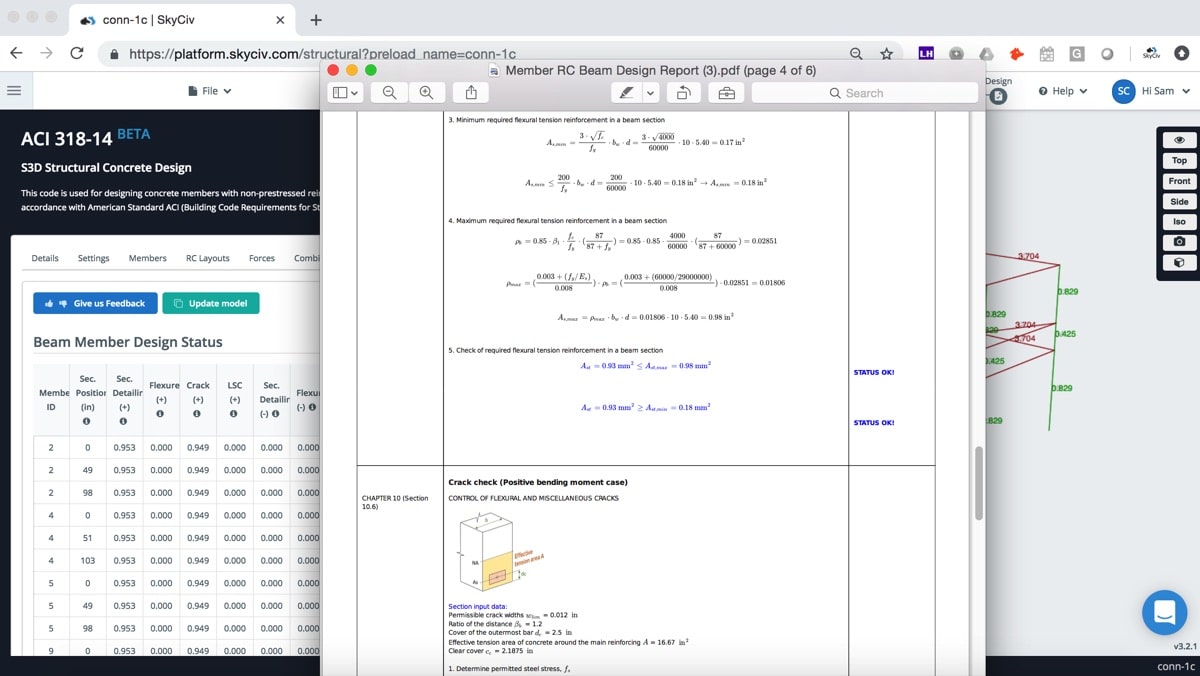Όλοι έχουμε πάει εκεί πριν. Εργάζεστε σε ένα έργο και θέλετε να σχεδιάσετε μια στήλη χρησιμοποιώντας ένα υλικό ή σχήμα που δεν είστε πολύ εξοικειωμένοι. Το εκτελείτε μέσω του ελέγχου σχεδίασης του λογισμικού σας και επιστρέφει με ένα Πέρασμα. Αλλά δεν είστε πολύ σίγουροι για το αποτέλεσμα. στην πραγματικότητα, έχετε κάποιες ερωτήσεις ή ανησυχίες σχετικά με αυτό. Έτσι ξοδεύετε περισσότερο χρόνο κάνοντας υπολογισμούς με τα χέρια και προσπαθώντας να καταλάβετε τι κάνει το λογισμικό για να υπολογίσει αυτήν την τιμή, ή εμπιστεύεστε το αποτέλεσμα στην ονομαστική τους αξία.
Ως δομικοί μηχανικοί όλοι έχουμε βιώσει αυτόν τον πόνο. Δώσαμε λοιπόν μια υπόσχεση στον κλάδο; να δημιουργήσετε λογισμικό δομικού σχεδιασμού που να είναι διαφανές, με σαφή αναφορά βήμα προς βήμα. Φαίνεται τόσο διαισθητικό, αλλά είναι κάτι που λείπει στον κλάδο μας. Στο σημερινό άρθρο θα διερευνήσουμε την απόφαση της SkyCiv να παρέχει λεπτομερείς αναφορές σχεδιασμού, γιατί είναι σημαντικό και πώς βοηθά τους χρήστες μας να λειτουργούν πιο γρήγορα και με μεγαλύτερη σαφήνεια.
Γιατί έχουμε αναφορά ανοιχτού σχεδιασμού?
Να έχετε εμπιστοσύνη στα σχέδιά σας
Πρώτα και κύρια, Θέλουμε οι χρήστες μας να είναι σίγουροι για το αποτέλεσμα. Έχουμε πολλά Διαδικασίες QA εδώ στο SkyCiv. Ωστόσο, εξακολουθεί να είναι σημαντικό για τους χρήστες μας να κατανοούν και να εμπιστεύονται τα αποτελέσματα, και να μην βασίζεστε μόνο στις άγνωστες εσωτερικές λειτουργίες του λογισμικού. Η δυνατότητα παρακολούθησης των υπολογισμών, αναφορές και υποθέσεις, σας δίνει την αυτοπεποίθηση να λαμβάνετε ασφαλείς και αποτελεσματικές αποφάσεις σχεδιασμού.

Παράδειγμα Ανοιχτής Αναφοράς Σχεδιασμού Οπλισμένου Σκυροδέματος
Βοήθησε επίσης τους μηχανικούς να αποφύγουν τον κίνδυνο τυφλής εξάρτησης από δομικό λογισμικό. Η εξέταση των εκθέσεων σχεδιασμού επιτρέπει στους μηχανικούς να επιβεβαιώνουν τους υπολογισμούς σχεδιασμού βήμα προς βήμα, ενώ εξακολουθούν να εφαρμόζουν τη διαίσθησή τους και την εμπειρία τους στη λύση.
Απαντήστε πιο γρήγορα στις ερωτήσεις
Ένα άλλο σημείο πόνου ήταν οι μέρες αναμονής (αν όχι εβδομάδες!) ώστε οι προγραμματιστές λογισμικού να απαντήσουν στις ερωτήσεις μας σχετικά με τους υπολογισμούς σχεδιασμού. Μία από τις προτάσεις αξίας μας εδώ στο SkyCiv είναι ότι δεσμευόμαστε παρέχοντας στους χρήστες μας απαντήσεις γρήγορα. Αυτό είναι εμφανές στη γρήγορη υποστήριξή μας σε πραγματικό χρόνο μέσω της δικής μας Υποστήριξη ζωντανής συνομιλίας που κατά μέσο όρο έχει α 36 λεπτό χρόνο απόκρισης.
Καταλάβαμε νωρίς στην ανάπτυξη του προϊόντος μας, ότι οι μηχανικοί έχουν ερωτήσεις σχετικά με τον τρόπο λειτουργίας του λογισμικού. Ποιες τιμές χρησιμοποιούνται στους υπολογισμούς? Σε ποια ρήτρα κώδικα σχεδίασης αναφέρεται το λογισμικό? Τι λογική χρησιμοποιείται? Μάλλον ότι στέλνουμε επανειλημμένα email στους χρήστες μας με αυτές τις απαντήσεις, σκεφτήκαμε – γιατί να μην τους δείξετε απλώς τους υπολογισμούς?
Υποστήριξη του API
Ένα API είναι ουσιαστικά σχεδιασμένο να είναι ένα μαύρο κουτί. Δεδομένα σε, δεδομένα. Ωστόσο, σκεφτήκαμε υπάρχει καλύτερος τρόπος να γίνει αυτό. Μπορούμε ακόμα να σας δώσουμε τις απαντήσεις που θέλετε, αλλά μέσω της ανοιχτής αναφοράς του σχεδιαστικού μας λογισμικού, μπορούμε επίσης να συμπεριλάβουμε λεπτομερείς αναφορές υπολογισμού.
Έτσι μέσω του API μας, θα λάβετε δύο πληροφορίες; (1) το τελικό αποτέλεσμα (2) την αναφορά PDF, εμφανίζει βήμα προς βήμα υπολογισμούς.
Ποιο από τα Λογισμικά μας είναι White-Boxed?
Η σύντομη απάντηση είναι ότι το μεγαλύτερο μέρος του λογισμικού σχεδιασμού μας είναι ανοιχτό, Αναφορά PDF βήμα προς βήμα. ΕΙΔΙΚΑ:
- Λογισμικό σχεδιασμού μελών χάλυβα – AISC, AISI, EN3, CSA, BS 5950
- Λογισμικό σχεδίασης RC – ACI 318, ΟΠΩΣ ΚΑΙ 3600, EN2, CSA Α23, BS 8110
- Σχεδιασμός σύνδεσης – AISC 360, EN3
- Λογισμικό φόρτωσης ανέμου/χιονιού – ASCE, AS / NZ 1170, NBCC, EN1991
- Λογισμικό σχεδιασμού ιδρύματος – ACI 318, ΟΠΩΣ ΚΑΙ 3600
Εάν θέλετε να δείτε την ανοιχτή αναφορά μας σε δράση, όλο αυτό το λογισμικό είναι διαθέσιμο κάτω από το Δωρεάν δοκιμή για το SkyCiv Professional για την οποία μπορείτε να εγγραφείτε στην αρχική μας σελίδα.
Δίνοντας στους μηχανικούς αυτό που θέλουν
Ως δομικοί μηχανικοί που υπογράφουν το έργο, ή ακόμα και παράδοση του έργου σε ανώτερο Π.Ε, πρέπει να έχεις εμπιστοσύνη στο αποτέλεσμα σου. Όχι μόνο αυτό, θέλετε να είστε σε θέση να εργαστείτε γρήγορα, έχοντας τις πληροφορίες που χρειάζεστε εύκολα προσβάσιμες.
Συνολικά, Νομίζω ότι έχει να κάνει με το να δώσουμε στους δομικούς μηχανικούς αυτό που θέλουν. Ο κλάδος ζήτησε ανοιχτές αναφορές και διαφανή σχέδια, και εμείς ως εταιρεία έχουμε παραδώσει. Δοκιμάστε το SkyCiv σήμερα και βιώστε τη δέσμευσή μας να δώσουμε στους μηχανικούς αυτό που θέλουν.
Διευθύνων Σύμβουλος και συνιδρυτής της SkyCiv
BEng (Εμφύλιος), BCom



